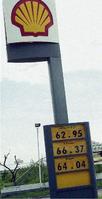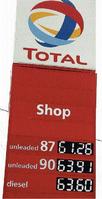

The price board for the Shell service station at Water Lane, Kingston, seen Friday and the price board for Total at National Heroes Circle, Kingston, seen Friday. - photos Norman Grindley/Deputy Chief Photographer Jamaica's fuel prices rose to their highest levels yet, but fell back to US$96.26 on Friday, as world oil continues to set weekly records, reaching US$97.10 a barrel.
All fuels, including kerosene and propane used for cooking and lighting, have shot to new records in Jamaica.
But any expectations of a gas subsidy as cushion for consumers were discounted Friday by Energy Minister Clive Mullings, who said it could easily wipe out Petrojam's already thin profit margins.
He reiterated that a strong conservation programme was "priority" to contain consumption.
Petrojam buys oil, largely from Venezuela, at prices that track the world market for 23-28 API grade crude.
Mullings said he has experts looking at the refinery's reference pricing model, which is benchmarked off the lighter and more expensive West Texas crude graded at 32 API and lighter.
That crude is among the most expensive.
In fact, New York light prices have risen 40 per cent since August and are expected to conquer the US$100 barrier in coming weeks.
Venezuela's reference pricing was quoted at about $73/bbl in October.
"We have to work out the numbers," said Mullings.
why prices jump
Petrojam boss, Winston Watson, says prices jump each time world refinery's shutter against bad weather, and that speculation on the commodities markets continues to pump steriods into oil.
Locally, the hardest-hit petroleum product has been diesel fuel, whose ex-refinery price has risen by 45 per cent year to date, from $41 at the first delivery date in January, to $60.04 on Thursday.
Regular 87 octane rose 26 per cent to $58.80, while premium 90 octane, which is now priced at $60.25, has risen 25 per cent year to date.
On an imperial basis, the ex-refinery price for regular gas is running at $225 per gallon.
Dealers add their margins at the pumps, which means motorists pay premiums of about $7 or more per litre on the wholesale price at which marketing companies and their dealers buy from Petrojam.
Checks at Kingston service stations, where the highest concentration of pumps are found, show prices for regular ranging from a low of $61.26 up to $68.
Diesel sells for up to $2 more than regular fuel.
Premium gas is billed within a range of $64 up to about $70.
Total Heroes Circle remains a low-price leader for fuel, but several service stations within the Cross Roads belt also offer good deals.
Several Shell dealers are quoting regular gas at the same price, $64.72, with premium gas selling at under $67.
deeper into oil bill
The volatility on the oil market is now expected to feed into Jamaica's oil bill, which is already projected to climb above US$2 billion, up from last year's near $1.8 billion, when Jamaica consumed 29.66 million barrels of pertroleum products.
Kerosene oil also now fetches an ex-refinery price of $60.71 per litre, making it the most expensive fuel marketed by Petrojam.
The price of kerosene overtook diesel in February, outpaced 87 octane at the end of July, and surpassed premium 90 on October 4.
The once-cheap fuel - whose prices have risen 49 per cent year to date from $40.75 - has become the most expensive.
Sunday Business' perusal of historic records on fuel prices dating back to 2004 indicate that kerosene and diesel prices have tended to compete.
Kerosene is consumed domestically by mostly rural households to fuel lamps and cooking fires.
Diesel has gained in popularity as more diesel-powered vehicles have entered Jamaica. Its chief selling point as a cheaper fuel no longer holds true.
Kerosene production accounted for 7,764 barrels of crude last year, or one third the consumption of 27,342 barrels in 2005, and one eighth the peak 60,606 barrels utilised in 2004.
sabrina.gordon@gleanerjm.com

